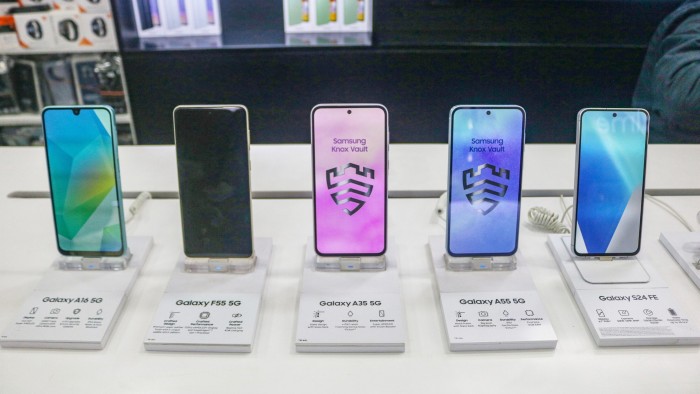Unlock the Editor’s Digest for free
Roula Khalaf, Editor of the FT, selects her favourite stories in this weekly newsletter.
Samsung Electronics has warned that US tariffs will hit demand for its products as the world’s largest maker of memory chips and smartphones presented a downbeat outlook for the year.
The South Korean company said “growing policy risks” would increase uncertainty for its chip business, while tariffs would raise prices for smartphone components and put downward pressure on mobile device sales.
“Ongoing uncertainty surrounding US tariff policies continues to pose a potential risk of demand slowdown,” said chief financial officer Park Soon-cheol during an earnings call on Wednesday.
“We believe changes to the tariff policies in major economies as well as stronger export controls against [artificial intelligence] have already been adding to rising uncertainties in expected demand in the second half.”
Donald Trump’s pause of his “reciprocal tariffs” had encouraged some customers to move up their orders, Samsung said, but the company cautioned the frontloading could have “some negative impact” on demand in the second half of the year.
The warning came as Samsung’s chip business reported a roughly 40 per cent drop in first-quarter operating profit as sales of its high-bandwidth memory chips used in AI hardware were hit by tougher US export controls on China.
Analysts estimate Samsung generates about a third of its HBM sales in China. The export controls’ impact outweighed an increase in orders from Chinese customers stockpiling memory chips ahead of US levies.
Most semiconductors have been exempt from Trump’s “reciprocal tariffs”, but the president has said he plans to impose duties on chips “very soon”. The US has also been tightening restrictions on chipmakers selling to China after Chinese AI start-up Deepseek’s breakthroughs this year.
Samsung shares fell 0.4 per cent on Wednesday along with the broader Kospi benchmark. The company’s shares are down more than 28 per cent for the year as it has failed to ride the AI boom.
The chipmaker is struggling to catch up with rival SK Hynix, whose shares have risen 2 per cent this year, in the high-margin HBM business. Samsung’s advanced HBM chips have yet to pass qualification tests for Nvidia, a major client of both companies.
Samsung spent Won9tn ($6.3bn) on research and development in the first quarter, up 16 per cent from a year ago, amid growing concern over its weakening technological edge. It plans to increase production of its advanced 12-layer HBM3E chips in the current quarter as it expects strong demand for AI servers.
“The memory cycle seems to have hit the bottom, but the company’s shares have been weighed by growing uncertainties related to tariffs and regulations,” said Albert Yong, managing partner at Petra Capital Management, a Seoul-based hedge fund. “Samsung’s performance is unlikely to improve dramatically without HBM sales to Nvidia.”
The US has suspended “reciprocal tariffs” on dozens of countries, including South Korea and Vietnam, until July but a minimum 10 per cent duty still applies and is likely to increase prices of Samsung’s various consumer electronics such as smartphones and TVs.
Samsung produces nearly half of its smartphones in Vietnam, while most of its TVs sold in North America are made in Mexico. The company said it would prepare measures to cope with US tariffs, including considering relocating the production of TVs and other home appliances.
Read the full article here
